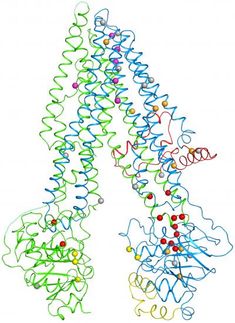Sodium channel blocker shows promise as a potential treatment for cystic fibrosis
Advertisement
cystic fibrosis patients may benefit from a new therapy that increases airway Hydration, preventing the buildup of mucous, which is a key factor in the disease, according to researchers at Parion Sciences in Durham, N.C. The research was presented during the American Thoracic Society's 105th International Conference in San Diego.
"Our results suggest that we have identified a new agent that acts directly on a specific pathway, which is involved in the development of cystic fibrosis," said lead author Andrew Hirsh, Ph.D., senior director of drug discovery and preclinical development for Parion Sciences.
In normal respiration, the moist surface of the airway allows individuals to effectively clear mucous, keeping airways open and viable. But in individuals with cystic fibrosis, the hydration level of the airway is altered and the airway mucous builds up, interfering with normal respiration. One of the mechanisms causing airways to not clear mucous correctly in these patients involves the body's natural homeostasis of sodium which, when absorbed too quickly from the surface of the airway, causes moisture to become absorbed too quickly.
"Cystic fibrosis patients have a genetic ion transport defect, which decreases the hydration level on the airway surface and therefore reduces the body's ability to effectively clear mucous, which is a primary defense mechanism of the respiratory system," Dr. Hirsh said. "Diminished mucous clearance leads to chronic respiratory infection and impaired pulmonary function. Currently there are no therapies available to specifically target this channel in patients with cystic fibrosis."
The aerosol-based therapy uses a specific epithelial sodium channel-blocking agent called GS-9411, which prevents sodium from being absorbed across the airway, allowing the surface to remain moist. The increase in moisture allows individuals to more effectively clear the airway of mucous and infectious agents. This study was performed during the pre-clinical stage of development to compare GS-9411 to an established epithelial sodium channel blocker, called amiloride. Currently, GS-9411 is in Phase I clinical trials being conducted by Parion's development partner, Gilead Sciences, Inc., in Foster City, CA.
During the study, researchers applied GS-9411 to airway surface cells grown in the laboratory, and assessed the potency and reversibility of the drug on these cells. Results of the study indicated GS-9411 allowed the cells to retain liquid for more than eight hours. Concurrent animal studies revealed that the agent enhanced mucous clearance for more than four hours.






















































